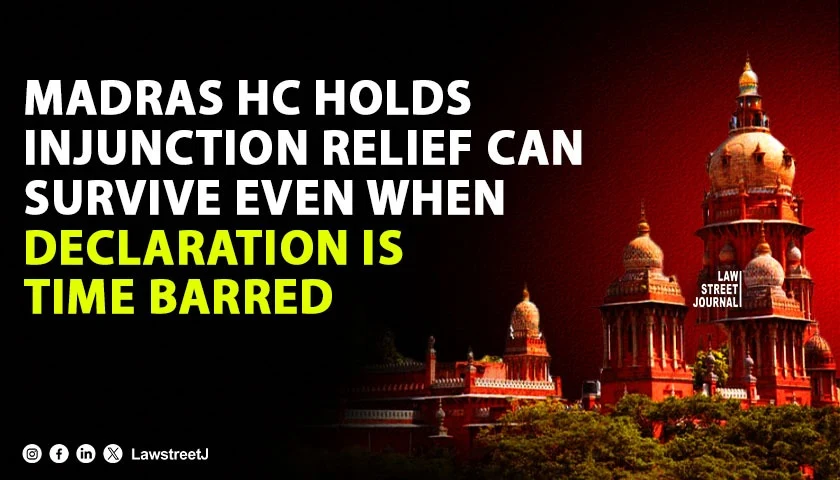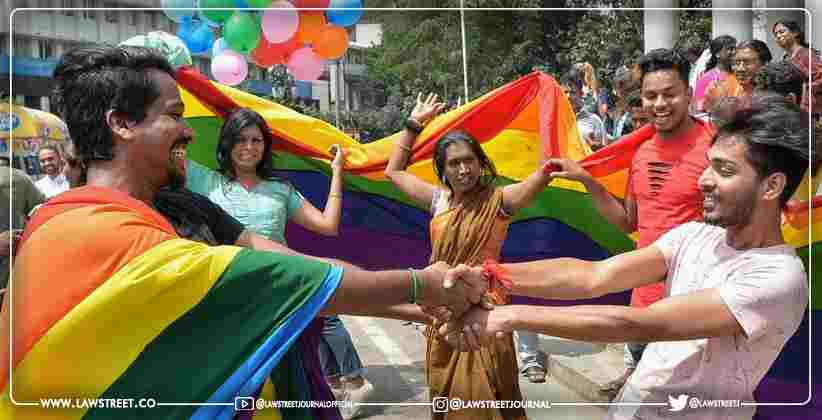Chennai: The Madras High Court has ruled that a suit for permanent injunction sought as an independent relief can be maintained even when the declaratory relief is barred by limitation, emphasizing that limitation only bars the remedy and does not extinguish substantive rights.
A division bench comprising Justice Dr. G. Jayachandran and Justice Mummineni Sudheer Kumar examined whether dismissing an entire suit on limitation grounds is justified when only one relief is time-barred while another independent relief remains viable.
The bench heard an appeal in OSA (CAD) No. 20 of 2022 filed by Sreedevi Video Corporation challenging a judgment dated 07.02.2022 in Civil Suit (Comm.) No. 331 of 2014 where the trial court dismissed the entire suit as barred by limitation.
The appellant claimed exclusive copyright in audio works of seven films through assignment agreements dated 17.07.2008 with the second and third respondents. The first respondent, SaReGaMa India Ltd., sent a letter on 06.08.2010 claiming sole ownership of the same copyrights and demanding the appellant cease exploitation of sound recordings.
The appellant did not respond to this letter but filed suit on 13.05.2014 seeking declaration of copyright ownership and permanent injunction. The trial court found the declaration relief barred by limitation under Article 58 of the Limitation Act (three years from first accrual of cause of action) since the suit was filed beyond three years from the 06.08.2010 letter. Crucially, the trial court also dismissed the permanent injunction claim, holding it was dependent on the declaration and therefore consequential in nature.
The appellant argued before the High Court that while not contesting the limitation finding on declaration, the trial court erred in dismissing the entire suit. The appellant contended permanent injunction was sought as an independent relief with separate court fee paid under Section 27(c) of the Tamil Nadu Court Fees and Suits Valuation Act, and Section 55 of the Copyright Act permits independent injunction relief for infringement.
The first respondent countered that the suit was rightly dismissed as the injunction relief was intrinsically connected to declaration, and once declaration is lost, injunction cannot stand.
Justice Sudheer Kumar, writing for the bench, found the trial court’s reasoning flawed. The court noted: “From the perusal of Paragraph No.26, it is not discernible as to how and on what basis and for what reasons the learned Single Judge came to the conclusion that the relief of permanent injunction sought by the plaintiff is dependent on the relief of declaration.”
The bench emphasized the foundational principle that “the bar of limitation would only bar the remedy and does not extinguish or impair the right, obligation or cause of action.” The court relied on the Bombay High Court decision in Shri Sayad Ahmed Kabuli vs. State of Maharashtra and the Supreme Court’s ruling in Bombay Dyeing & Manufacturing Co. vs. State of Bombay, which held that limitation statutes bar the remedy but do not extinguish debt or substantive rights.
The court observed: “The mere fact that the suit filed for relief of declaration is found to be barred by limitation, the same will not have the effect of extinguishing the rights that are being claimed by the plaintiff in the Schedule Films automatically. The rights, if any, possessed by the plaintiff would remain intact notwithstanding the fact that the relief of declaration sought was found to be barred by limitation.”
Critically, the bench held: “Mere fact that the relief of declaration is declined on the ground of limitation, the same will not have the effect of conferring title on the 1st defendant. It is only in case the relief of declaration sought by the plaintiff is declined by the Court on examining the rival case on merits” that title would be determined.
Regarding Section 55 of the Copyright Act, the court stated: “The relief of permanent injunction sought for by the plaintiff as an independent relief by duly paying a separate Court fee can be construed as a relief sought under Section 55 of the Copyright Act, 1957, but not as a consequential relief of declaration.”
The bench rejected the trial court’s view that injunction suits can only fall under Article 113 when there’s no title dispute: “Whether there is dispute over the right and title or not, it is for the plaintiff to decide as to the nature of relief that he should pray for. Merely because there is dispute over the title, that would not bar the party from instituting a suit for permanent injunction basing on title.”
The court distinguished the Supreme Court decision in Padhiyar Prahladji Chenaji vs. Maniben Jagmalbhai relied upon by the respondent, noting that case involved consequential relief, unlike the present case where injunction was sought independently.
The bench partly allowed the appeal, upholding the finding that declaration relief is time-barred but setting aside dismissal of the entire suit. The matter was remanded for adjudication on merits excluding the declaration relief. The court clarified it expressed no opinion on whether permanent injunction itself is within limitation, leaving that for the trial court’s examination.
Given the suit dates to 2014, the bench requested the trial judge to dispose of the matter expeditiously on priority basis.
Mr. K. Harishankar appeared for the appellant, while Mr. P.R. Raman, Senior Counsel, represented the first respondent.
Case Title: M/s. Sreedevi Video Corporation vs. M/s. SaReGaMa India Ltd. and Others




![TN Medical Council declares change of gender identity of LGBTQIA+ as misconduct [Read Notification]](/secure/uploads/2022/12/lj_5268_5cebb05a-97fb-40fb-8045-25cdf8f4207a.jpg)
![Madras High Court Directs Tamil Nadu Government to Ensure Quota for Transgenders in Local Body Elections [Read Order]](/secure/uploads/2023/08/lj_2507_7a03d113-08b1-4670-b6fb-9058aee481d0.jpg)
![Anti Corruption sleuths acted like "puppets in The Muppet Show", HC notice to ex TN CM in disproportionate assets case [Read Order]](/secure/uploads/2023/09/lj_8675_7b37fc02-1b2d-4f4a-9816-3df20545b37e.jpg)





